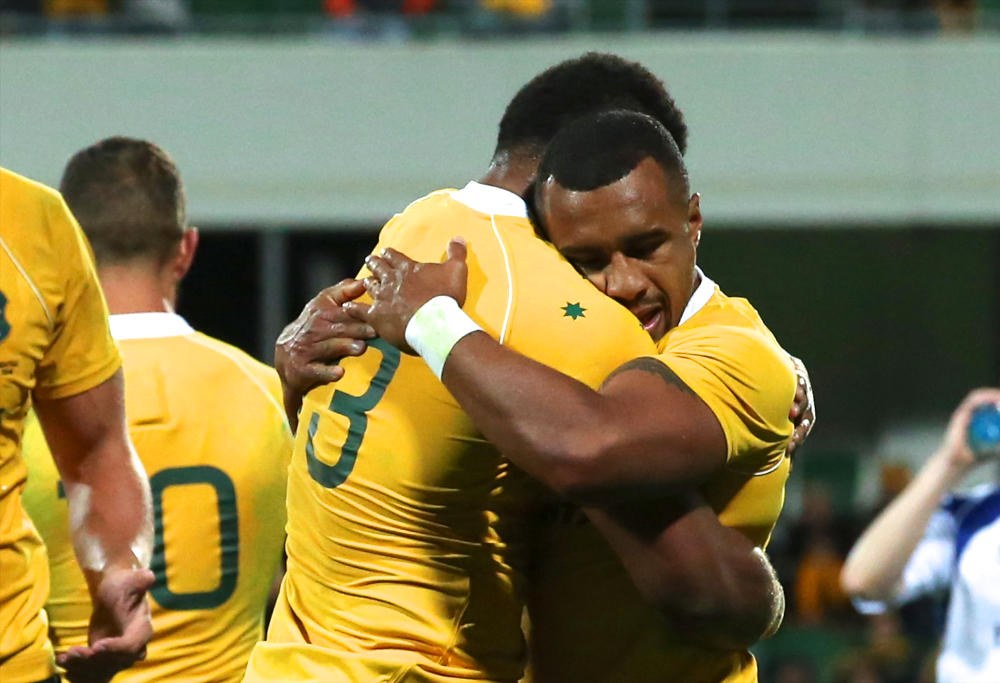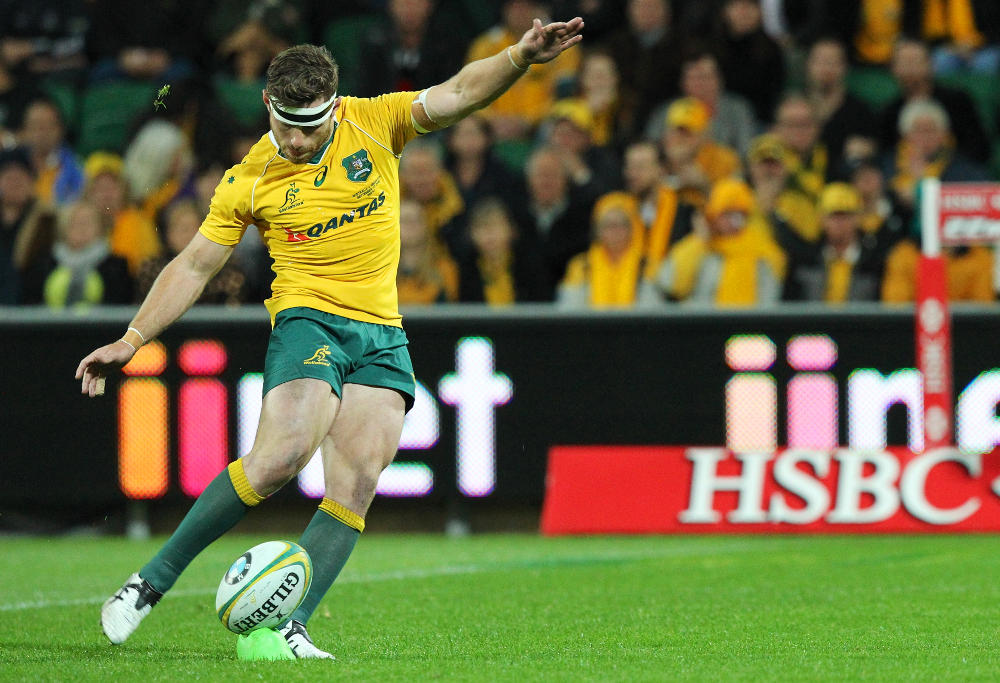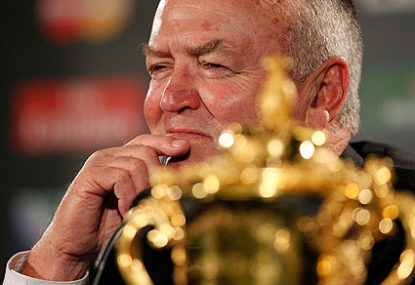Here is Sir Graham Henry, arguably the best rugby coach in professional era, before last weekend’s Rugby Championship Tests: “It’s a concern. We haven’t played South Africa yet, but they got beaten by Australia and they are woeful.
“I think they are probably the worst Australian team I have ever seen and that’s a real worry for the game. You want Australia playing rugby and you want Australia playing well.”
What is Henry on about?
Well, context is everything in these matters. Henry made his comments before the Wallabies played their Test at Perth against the Pumas.
And remember, Henry took on the role of assistant coach to the Pumas in 2012. He was instrumental in convincing the Argentinians that their rugby would never become top tier until they embraced the ‘Total Rugby’ game over their devotion to ‘Power Rugby’.
My hunch is that Henry expected the Pumas to defeat the Wallabies playing Henry-inspired Total Rugby.
And that expectation was based on their impressive 50 minutes or so of Total Rugby against the All Blacks at Hamilton. The Pumas extended the All Blacks like no other side, Wales or the Wallabies, has this year.
Then they were routed when the All Blacks reserves cavalry arrived.
The Henry implication was, and many of us in the rugby media including myself harboured the same thought, that if the Pumas could repeat their early heroics against the All Blacks then the Wallabies would struggle to get a victory.
And if the loss did happen, then the Wallabies would have lost five Tests at home (three against England, one against the All Blacks, and one -theoretically – against the Pumas) in one season, something that has not happened before even in the era of the Woeful Wallabies.
As it actually happened, the Wallabies raced out to a 21-0 lead within 12 minutes of the start of play. Although the Pumas came back after this, the Wallabies kicked on again and took out an impressive (on the scoreboard at least) 36-20 victory.
So much for the worst ever Wallabies. They are second in the Rugby Championship and still third on the World Rugby rankings.(Click to Tweet)
I think that Wallabies coach Michael Cheika got the tone exactly right with his curt dismissal of Henry’s stupid remarks: “I don’t care what Graham Henry says … I couldn’t care what he says. He’s got no relevance to me. Maybe in his own mind, that’s good for him. He doesn’t need to tell me and I don’t need to listen to him.”

This is not to say that Cheika doesn’t have problems with his side, going forward. He does. He is finding the transition from creating a new 2016-2019 Wallabies team out of the rump of the side that lost the final of the Rugby World Cup 2015 tournament extremely difficult to manage.
The All Blacks obviously have made the transition. The Steve Hansen plan for winning the Rugby World Cup 2015 tournament had built into it a subsidiary plan to bring along young players to replace the ageing stars. As Hansen told journalists at the beginning of this Test season, he was not about re-building in 2016. He was intent on “re-establishing.”
And this is what has happened. There are some commentators in New Zealand who argue that the 2016 All Blacks are already a better side than the 2015 Rugby World Cup champions.
England, too, under the new broom coaching of Eddie Jones have made a successful transition from not making the 2015 Rugby World Cup finals – the first time ever for a host nation – to winning the 2016 Six Nations tournament and winning an unprecedented three successive Tests in a series against the Wallabies in Australia.
The Springboks, deemed by Henry to be “woeful,” are struggling to make a successful transition from their third place in Rugby World Cup 2015. This year they have lost to Ireland, the Pumas and the Wallabies.
The Wallabies have now won two successive Tests to round out their home season. The four defeats and two wins outcome at home in 2016 isn’t something to gladden the hearts of supporters (witness the pathetic crowds to the last two Tests). But at least the wins are coming now. And they are after the defeats and not before them.
Having said this, there are many worrying signs still for the Wallabies coming out of the win against the Pumas.
The way the Wallaby forwards were out-played in a matter of great concern. The Pumas forwards won 67 per cent of possession. You don’t win many Tests when you don’t have much possession.
The Wallabies had two players given a yellow card.
The penalty count was 11-2 against the Wallabies in the first 40 minutes. The final count was 16-7 in favour of the Pumas. The Wallabies could not blame the referee Wayne Barnes treating skipper Stephen Moore with some sort of bias against him and his side.
Incidentally, I was amused at Rod Kafer’s comment when the Wallabies, leading 21-0, gave away a penalty on their own try line to stop a Pumas try: “This is a good penalty to give away for the Wallabies .. don’t let them score a try …”
This is the same Kafer, along with Phil Kearns, who is forever banging away about how “cynical” the All Blacks are in giving away penalties inside their 22.
The Pumas had 181 runs to the 67 made by the Wallabies.
The previously strong Wallabies lost three of their 12 scrum feeds.
These are statistics that point to serious skill and selection weaknesses in the Wallabies squad.
The two small five-eighths (Quade Cooper and Bernard Foley) system creates clean out problems when one them takes the ball into a tackle. The Wallabies lost several turnovers and penalties because either Cooper or Foley missed or could not successfully complete their turnover.
Following the victory against the Springboks two weeks ago, coach Cheika made only one change to the starting side for the Test against the Pumas, with Rob Simmons coming into the second row to replace the stalwart Kane Douglas.

Cheika justified keeping his virtual starting side together on the grounds that “continuity will help us.” He went on to tell the media that “I’m not looking for the right mix right now. Everyone’s always crying about us having no depth, well we’re taking the measure to create depth (in the second row.)”
I find this a difficult statement to understand. Test matches, especially when there has been a series of unexpected losses, are not vehicles to drive experiments. You (should) pick your best side, not the side that might gives you clues as to your best side.
Continuity in selection, when the selections are dubious, is not a good thing. It is a sign of favouritism (a no-no for all coaches) or a lack of insight into what is going well and badly for his side.
The reason why Cheika is the head coach is because he is expected to know what his best side is, and then select it.
I would name three of the starting forwards, Stephen Moore, Rob Simmons and Dean Mumm, whose time in the gold jersey surely must be near enough to be finished.
David Pocock’s hand injury means that he has to be replaced for the last three Tests before the November tour to Europe. Even without this injury, the experiment of playing him at number 8 has been a failure. I supported it as a way of getting Pocock and Michael Hooper into the same forward pack. But Pocock does not have the running, jumping or covering skills that a number 8 needs.
Hooper had a storming game at number 7. And Sean McMahon was equally storming when he came on and should replace Pocock as the starting number 8.
Cheika could give himself a tall lineout by linking Adam Coleman and Rory Arnold in the second row and bringing back Scott Fardy as the blindside flanker.
And in the backs, there is a compelling case to reject the small five-eights system, with Bernard Foley surely playing either number 10 (although Quade Cooper is now the better option) or moved on the reserves bench.
Moreover, Israel Folau needs to be shifted from the fullback position, where he has been generally ineffectual, and played on the wing.
Folau is the most over-rated player in world rugby right now. He has limited rugby skills, running and jumping are his strengths. The wing should be his position. It is where Robbie Deans played him with great success against the British and Irish Lions.
Reece Hodge and Samu Kerevi should come into the centres and Dane Haylett-Petty selected in his best position, which is fullback.
Knowing Cheika’s penchant to be extremely cautious with his selections, generally in favour of older players, I don’t expect him to make many changes to the side that will play the Springboks at Pretoria in two weeks’ time.
This sort of delaying the inevitable means that the changes will have to be made, or should be made, on the European tour, which is also a rare Grand Slam tour. Will Cheika take the selection risk then?
Complicating these selection issues has been the earlier decision to bring back the four veterans from France, Matt Giteau, Adam Ashley-Cooper, Drew Mitchell and Will Genia under the 60/7 Giteau Law requirements.
Let me be honest about this, I opposed the return of the Giteau Law players. But I will concede Will Genia has been outstanding against the Springboks and the Pumas.
Whether someone like Nick Frisby could have matched this is debatable.
But Frisby was dropped from the squad to allow for the Giteau Law players, a poor decision by Cheika going into the future for the Wallabies. Someone has to be developed, and it is not Nick Phipps, to be the Wallabies starting halfback when Genia is not available.
As for Giteau (who played 12 minutes), Ashley-Cooper (two mediocre Tests and then out injured) and Mitchell (11 minutes on the field and still deemed to be unfit for a starting position), these three veterans have been a total waste of time for the Wallabies.
I don’t go along with the Cheika argument that they bring “experience” to the Wallabies camp.
They kept younger players out of the squad (think Andrew Kellaway, for instance) and they behaved with a certain stupidity off the field that reflected the reason why they were controversial figures (Giteau and Ashley-Cooper, particularly) in their salad days.
Genia, I should add, is the exception to this criticism. He has been exemplary, on and off the field.
If the Giteau Law is to be retained it should be used in non-Rugby World Cup years and only for players who will go on to play in the next Rugby World Cup tournament. Under this provision, only Genia would have qualified to be brought back to Australia this year.
All the players eligible under the Giteau Law requirements playing out of Australia would be eligible for selection for the Rugby World Cup tournament, however.
In the best of all worlds, the Giteau Law should be scrapped. It was forced on Bill Pulver, the CEO of the ARU, against his expressed intention by agents of the leading players. With more and more players reaching the golden 60/7 mark, Australian rugby is going to see an exodus of experienced players who should be enhancing the ruggy game here, not overseas.
The number one and number two teams in world rugby, the All Blacks and England, will not select players who do not play in New Zealand or England, as the case may be.
Moreover, in New Zealand, the experience that younger, rising players have in playing with current All Blacks is one of the major factors in their development as potential Test rugby stars.
Finally, when the ARU and SARU allow overseas players to play for their national side they are diminishing the Super Rugby tournament which is a major source of revenue for them and enhancing the competition from the English and French tournaments.
This brings us back to Graham Henry and his criticism of the Wallabies and the Springboks.
It can’t be helpful in the creation of a winning Test side for coaches like Michael Cheika and Allister Coetzee to have the mindset that players well past their best and playing overseas in rugby tournaments that favour slow grind play can somehow compete against the super-fit, super skilled All Blacks.
How, for instance, can the Wallabies develop inside backs when coach Cheika reckoned his best option this year was Matt Giteau, a player in his prime in 2007?
And for the Springboks, how can the team gain access to talented number 10s when Morne Steyn, like Giteau in his prime in 2007, is the designated reserve?































































































